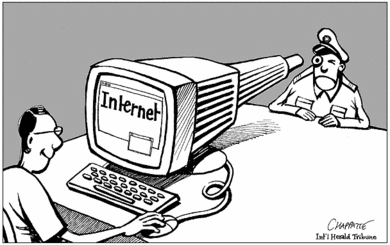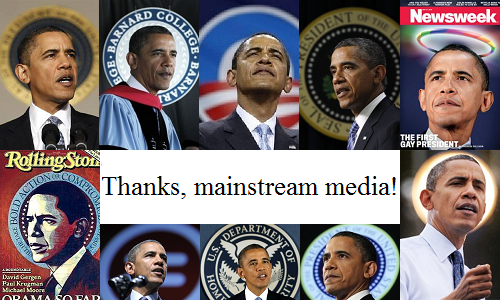According to legend, the media is a pillar of democracy. The free press informs the public objectively, without bias, “just the facts, ma’am”. They staunchly champion freedom of speech; that’s their bread and butter! Their intrepid reporters expose high-level corruption, protecting the little guy from abuses by the wealthy and powerful.
Today’s reality is nearly the opposite. Worse, now they’re enthusiastically participating in censorship.
“Shut it down!”

Jason Koebler, a Vice editor for Motherboard (their technology column), posted “Deplatforming Works“, practically gloating about it.
It’s true that Silicon Valley’s lethargy on the far-right, aided by endless press coverage, helped amplify their message and turned the far right into a real, powerful political force in the United States.
So he believes that tech giants have been too slow in suppressing views that he doesn’t like. Still, he worries about what happens when they move to alternative platforms that respect freedom of expression. Further, he laments that censoring popular commentators generates publicity:
Deplatforming works “best” when the people being deplatformed don’t have any power to begin with.
That’s quite an unfiltered glimpse into the media mentality. He denies the censorship is ideologically motivated. Well, how often do leftists get banned for “extremist” opinions, criticizing groups they dislike, or controversial opinions about history?
The new Ministry of Truth

Not only do they have a near-monopoly on commercially distributed information, they’ve taken it upon themselves to suppress dissident viewpoints.
Another whopper, co-authored by Jason Koebler and Joseph Cox, described how journalists serve as social media tattletales:
In a recent interview at Facebook headquarters, one senior company employee told Motherboard that Facebook somewhat formalized the process of responding to content moderation-related inquiries from journalists, and has a dedicated system for ‘escalating’ issues highlighted by journalists. This often gets the content in front of those deciding whether to remove it or not more quickly than ordinary user-generated reports.
Thanks for the tip, dude. I’ve been wondering who’s been doing this sneaky behind-the-scenes stuff. As I’ve suspected, this goes much further than tricky “watchdog” outfits, or Social Justice Warriors orchestrating mobbing campaigns on Tumblr.
So he brazenly admitted that Lügenpresse employees are colluding with social media companies, ratting out content which they think the public shouldn’t be allowed to see. (Is that what college journalism departments teach kids these days?) Since the tech giants in cahoots with them created special pipelines to expedite the snitching, apparently this happens pretty frequently.
Last month, when explaining why Twitter hadn’t initially banned InfoWars from its platform, CEO Jack Dorsey said “it’s critical journalists document, validate and refute [dis]information directly so people can form their own opinions. This is what serves the public conversation best.”
Given the MSM’s track record of bias, distortion, and outright lies, their new side job of censoring dissident viewpoints is like a fox guarding the henhouse. (Jack Dorsey’s statement is almost as much of a whopper as when Barbara Spectre said, “But without that leading role, and without that transformation [to multiculturalism], Europe will not survive.”) It gets more nauseating yet:
Wednesday, at a Senate Intelligence Committee hearing, Dorsey again noted the role that journalists play in counteracting disinformation that spreads and is incentivized on his platform.
“We have this amazing constituency of journalists globally using our service every single day, and they often with a high degree of velocity call out unfactual information,” Dorsey said.
Senate Intelligence Committee—well, isn’t that special? If this “amazing constituency” is up to this daily, is all that really topical investigative research, or more like cyber-loafing?
Guarding the echo chamber

Journolist closed after this secret back channel was exposed. Is there anything else like that going on now?
Although that article seems unconcerned about ethics or freedom of speech, it correctly explains that tattling about social media posts for Silicon Valley billionaires isn’t the job they’re supposed to be doing. Journalists are paid to write stories. I’ll add that if they’re acting like Glavlit informers while on the clock, they’re stealing from their companies, just like if they’re playing Warcrack.
To be clear, every platform has moderators or algorithms which catch the vast majority of content violations on a platform. But still, many of the highest-profile content moderation decisions seem to be made only after there’s publicity around them. For example, InfoWars was only banned from platforms after a steady drumbeat of reporting surrounding the disinformation and hate speech spread by Alex Jones.
Jones got banned from four major platforms simultaneously. Anyone who believes the timing was a coincidence probably believes in the Easter Bunny too. Are the esteemed members of the Fourth Estate still using transmission belts hidden from the public like Journolist?
Here’s how it rolls at their own company:
At Motherboard, we’ve increasingly decided to withhold specific examples from tech companies when approaching them for an article. Of course, if they really need an example in order to have enough context to comment—if it’s a single specific video for instance—it would probably be best to provide a link to the clip. And we will give them enough context about what the videos are and the issue so they can write a statement explaining why they believe the content should or shouldn’t be removed. But for more general issues, or especially public material that can be found with a simple search, the companies don’t need hand holding to find the videos: indeed, the point is that they could have—and perhaps should have—come across them easily in the first place.
Finally:
Facebook also told Motherboard many other reporters have stopped sharing links to specific pieces of content until after the stories are published. Facebook believes it is beneficial to everyone if the company is able to remove violating content as quickly as possible.
So their take seems essentially like this:
- Journalists are getting sick of working so hard at performing censorship for other companies, instead of doing their real jobs.
- They wish the tech giants would make better programs to delete politically incorrect content robotically.
- If they write a clickbait article about it, they’re disappointed that the content gets banned first.
It’s little wonder why people don’t trust the Lügenpresse. Even most liberals today realize the MSM is bullshit!
Why dissident views are important

What’s with all these halos? Were they trying to tell us that “The Lightworker” is the Messiah?
Media outlets do have ideological positions. That’s understood, so long as long as that stuff stays in the op-eds and news is unbiased. According to legend, diversity of opinion throughout the media will allow the public to sort things out for themselves. However, 90% of the USA’s media outlets are owned by six gigantic conglomerates. Five are little more than propaganda factories for cultural Marxism. The one essentially representing the controlled opposition doesn’t stray too far from prevailing orthodoxy, or touch many vital topics.
The MSM is an oligopoly with vast powers to shape opinion. Therefore, dissident voices free of interference are the only ones breaking the information blockade. It’s the “deplorables” who now are looking out for the public, calling out subversion sometimes rising to treasonable levels when nobody else dares call it treason.
Finally, Jason Koebler has written several articles about data mining misuses. That much is admirable. Ironically, the MSM overlooks another problem with tech giants abusing monopolistic powers, often even assisting them. Not only do huge social media companies get a free pass for censorship, some journalists merely wish there was more of it so they can quit doing free work for them.
Don’t miss Beau’s book catalog. Good stuff!
Read More: Confessions Of A Former Journalist In The Corrupt Media Establishment